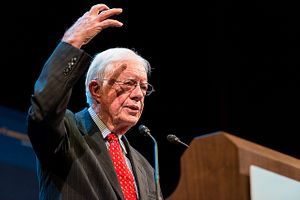Since U.S. President Donald Trump came into office, the North Korean issue has become the toughest diplomatic problem between China and the United States, as neither side sees eye to eye on the other’s North Korean policy.
But China at least seems to have found one influential ally in the U.S. who appears to share the same views of North Korea: Jimmy Carter, the 39th president of the United States as well as Nobel Peace Prize laureate in 2002. In a rare move, Chinese foreign ministry publicly quoted Carter, who suggested lately that the United States should send a delegation to Pyongyang for peace talks.
On October 4, Carter, 93, published an article on North Korea on The Washington Post. Based on his personal experience with “top North Korean officials and private citizens” during visits in North Korea in the past 20-plus years, Carter argued that the next step for the United States should be “to offer to send a high-level delegation to Pyongyang for peace talks or to support an international conference including North and South Korea, the United States and China, at a mutually acceptable site.”
This suggestion is well in line with China’s proposal, as China has called for resumption of six-party talks, particularly direct dialogue between North Korea and the United States on security issues, numerous times.
In particular, Carter mentioned that North Korea, led by current leader Kim Jong-un, is no longer under influence or pressure from outside, including from China. This is a point actually that has also been emphasized by Beijing in multiple occasions.
Naturally, Carter’s article immediately caught China’s attention. On October 9, at the first regular press conference after the eight-day Chinese National Day holiday, when responding to Trump’s latest Twitter on North Korea, Chinese foreign ministry spokeswoman Hua Chunying fully quoted Carter’s suggestion rather than directly commenting Trump’s aggressive rhetoric. That’s no doubt significant, since it’s a rare move for the ministry to proactively cite a specific foreign person’s remarks in the press conference.
Further, Hua urged all parties once again to “strictly observe and implement the UN Security Council resolutions, refrain from provoking each other and aggravating the contradiction, [and] exercise restraint and caution to ease the tension.”
While Hua did stick to China’s usual stance on North Korean issue, what’s noteworthy this time is that she appeared to have softened her tone toward the United States, despite the fact that Trump repeatedly made clear his disdain for dialogue and hinted at military actions towards North Korea recently.
From Beijing’s perspective, China has employed all sorts of diplomatic techniques to convince Trump to “sit down at the negotiating table” with North Korea, but no technique seems to have worked so far. Chinese President Xi Jinping gave Trump a history lesson on North Korea in “candid and positive” talks in Florida in April. Then, Xi discussed the North Korean crisis with Trump by phone twice in two weeks before Trump spoke to the United Nations, but Trump still threatened to “totally destroy North Korea”. China has played the pity card by claiming “great sacrifices” on North Korea issues, and has also tried to played tough and criticized U.S. policy on North Korea harshly in various press briefings. But when the U.S. Secretary of State Rex Tillerson finally showed some positive signals by saying that Washington was speaking to Pyongyang, Trump said Tillerson was “wasting his time.”
On China’s end, Carter’s latest article undoubtedly looks like a letter from an ally. As an ex-U.S. president, Carter happened to present China’s point of view in an eloquent way toward the American people.
To make matters better, Carter, despite his old age, even volunteered to represent the United States to visit North Korea and hold talks with Kim Jong-un, according to Yonhap News Agency, which cited Park Han-shik, a professor emeritus at the University of Georgia.
To China, Carter would play a perfect role if his proposal comes true. Carter completed a similar task in 1994 during the Bill Clinton administration by successfully persuading Kim Il-sung (Kim Jong-un’s grandfather) to negotiate with the United States, and in the following years, Carter has been well received in North Korea. Carter also enjoys a good reputation and high popularity in China, as China and the United States established diplomatic ties during Carter’s tenure of office. In Beijing’s eyes, Carter is “the most approachable U.S. president” since he understands the situation and knows what others want.

































